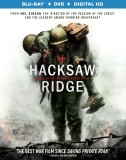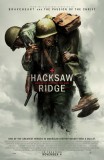Hacksaw Ridge Movie Review

Hacksaw Ridge is now available on home video. Read our review of the Blu-ray + DVD combo. Enter to win it.
 |
Hacksaw Ridge
Theatrical Release: November 4, 2016 / Running Time: 138 Minutes / Rating: R Director: Mel Gibson / Writers: Robert Schenkkan, Andrew Knight Cast: Andrew Garfield (Desmond Doss), Sam Worthington (Captain Glover), Luke Bracey (Smitty Ryker), Teresa Palmer (Dorothy Schutte), Hugo Weaving (Tom Doss), Rachel Griffiths (Bertha Doss), Vince Vaughn (Sgt. Howell), Matt Nable (Lt. Colonel Cooney), Nathaniel Buzolic (Harold "Hal" Doss), Richard Roxburgh (Colonel Stelzer), Ryan Corr (Lieutenant Manville), Milo Gibson (Lucky Ford), Goran Kleut ("Ghoul"), Firass Dirani (Vito Rinnelli), Luke Pegler (Hollywood Zane), Ben Mingay (Grease Nolan), James Mackay (Prosecutor), Darcy Bryce (Young Desmond Doss), Roman Guerriero (Young "Hal" Doss) |
Reprehensible private comments made public turned Mel Gibson into a Hollywood outcast, but they can't make us forget the filmmaking gifts he displayed on The Man Without a Face, Braveheart and The Passion of the Christ. Ten years after his last time at the helm (2006's Apocalypto) and half a dozen failed attempts to revive his acting career later, Glimpses of Desmond's childhood establish him as one of two fight-prone brothers whose father (Hugo Weaving) is an alcoholic World War I veteran. A near-lethal incident in which Desmond struck his brother in the face with a brick drives the boy away from violence. As a young man, Desmond (Andrew Garfield henceforth) is a good boy, who helps out his family's church and saves a stranger's life with a quick-thinking, improvised tourniquet.
The latter incident introduces Des to Dorothy Schutte (Teresa Palmer), a pretty nurse he charms. Before long, he's asked Dorothy to marry him before he enlists in the Army. With romance mostly out of the way, we move to the main event: Desmond's experiences in the Army. In basic training, he is taunted by officers and peers alike for his unprecedented position not to touch a weapon. The officers (Vince Vaughn and Sam Worthington) try to get him dismissed with a psychological evaluation and court martial. The peers leave him bruised and bloodied in a display of threatened solidarity.
But when the time comes, Des is there with his fellow troops in Japan, prepared to do what he can in the Battle of Okinawa. There, the Allied soldiers face great resistance as they try to ascend Hacksaw Ridge, a mountain fortified by heavily armed and well-defended Japanese soldiers. Can Desmond stay alive and somehow prove heroic without lifting a rifle? Would anyone be making a movie about him seventy years later if he couldn't?
Knowing Gibson, you expect Hacksaw Ridge to be a graphic and violent experience. An opening scene and the hard R rating suggest it will be. So, it's surprising to then get close to an hour of what feels like the romantic portions of Michael Bay's Pearl Harbor. Hacksaw is somewhat sweet and plenty corny in these parts. But you always know they are just the appetizer to a main course in which torsos will be shredded, limbs will go flying, and brain fragments will splatter. Gibson does not shy from the brutality of WWII, which for a long time was glamorized by the movies and understandably so. But nearly twenty years have passed since Saving Private Ryan and by now, most of us are familiar with the hellishness and savagery experienced by what Tom Brokaw deemed The Greatest Generation.
While Hacksaw Ridge can't surprise us in this way, it can still stir and unsettle us and it does. But it distinguishes itself from other war movies by focusing not on an ensemble of fictional composites, but on one unusual and largely unsung hero. Doss, a Seventh-day Adventist who requests Saturdays off in observation of his sabbath, clings to his faith just as he clings to the pocket-sized Bible that Dorothy gives him with a photo of her inside. And while most Hollywood movies that bring faith into the mix keep things PG-rated and amateurish, Gibson knows how to incorporate belief into cinema that is simultaneously polished, gritty, mainstream, and artistic.
Garfield's appealing lead performance, as well as his lead turn in Martin Scorsese's promising-on-paper Silence, makes a strong case for him having a productive career long beyond his short stint as Spider-Man. Can Hacksaw Ridge give Gibson the industry-wide redemption that has eluded him for the past ten years? It's tough to say. Apocalypto, released at the height of his initial drunken arrest controversy, managed to gross over $50 million domestic and $120 M worldwide and that was a violent Mayan language action epic. This film would seem to be more accessible and relatable, but it also is distributed by Lionsgate, a studio largely unversed in prestige fare. The early November release date suggests that Hacksaw wants to wear that label, but I would be surprised if it becomes a major player in the awards season even if both critics and moviegoers are onboard (two big ifs).
|
Related Reviews:
DVDizzy.com | DVD and Blu-ray Reviews | New and Upcoming DVD & Blu-ray Schedule | Upcoming Cover Art | Search This Site
DVDizzy.com Top Stories:
Hacksaw Ridge (Blu-ray + DVD + Digital HD)
Now in Theaters: Moonlight • The Accountant • Jack Reacher: Never Go Back • Deepwater Horizon • Sully • Voyage of Time • Snowden
Andrew Garfield: 99 Homes • The Amazing Spider-Man • The Amazing Spider-Man 2 | Teresa Palmer: Knight of Cups • Lights Out
Vince Vaughn: Fred Claus • Delivery Man | Sam Worthington: Everest • Avatar | Hugo Weaving: The Dressmaker
Directed by Mel Gibson: Apocalypto • Braveheart
Text copyright 2016 DVDizzy.com. Images copyright 2016 Summit Entertainment, Cross Creek Pictures, Demarest Media, Argent Pictures, IM Global, AI Film Productions,
Vendian Entertainment, Kylin Pictures, Pandemonium Films, Permut Presentations, and Lionsgate. Unauthorized reproduction prohibited.

